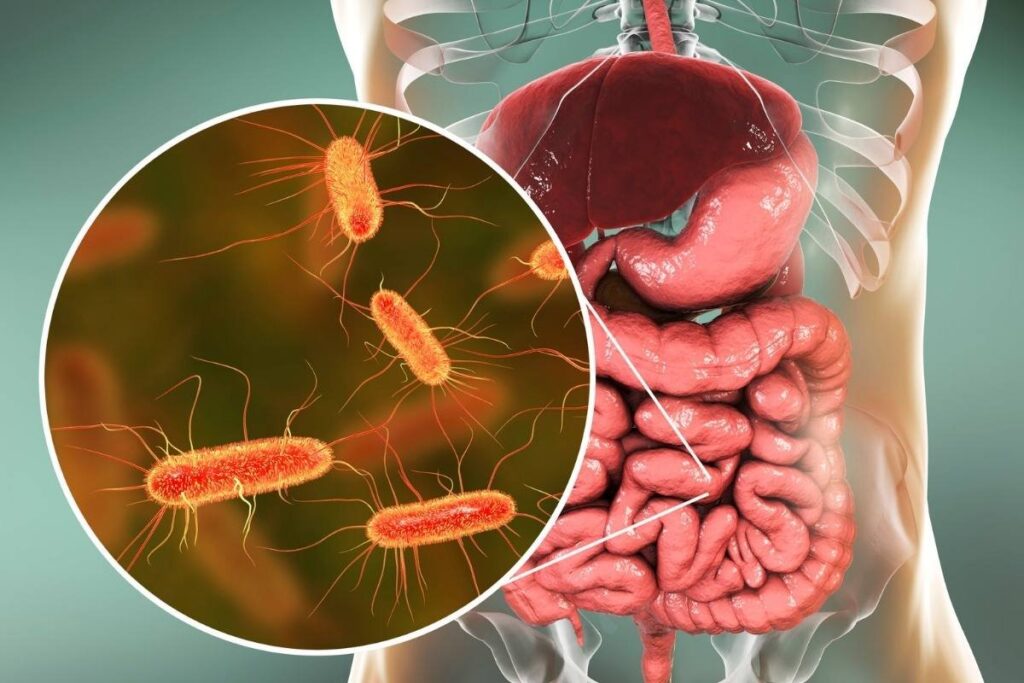Your gut is essential for digestion, immune function, mental health, and metabolism. Maintaining a healthy gut through diet and lifestyle improves overall well-being.
In this article, we will explore the secrets of your gut and how you can hack your health by taking care of it.
What is Your Gut and Why Does It Matter?

Your gut is made up of the stomach, small intestine, and large intestine, but it also includes the microbiome—billions of tiny bacteria that live in your digestive system. These bacteria play a key role in your health, helping with digestion, producing essential nutrients, and even supporting your immune system.
When your gut is in balance, your body can absorb the nutrients it needs from food, and your immune system can defend you against harmful invaders. However, when the gut is out of balance, it can lead to digestive problems, immune issues, and even mood changes. That’s why taking care of your gut is one of the best ways to improve your health.
How Does Your Gut Affect Your Health?
Digestion and Nutrient Absorption:
Your gut plays a crucial role in breaking down food and absorbing vital nutrients. When your gut is functioning well, it helps you digest food properly and absorb necessary vitamins and minerals. However, poor gut health can lead to digestive issues such as bloating, gas, and conditions like IBS or leaky gut. A healthy gut ensures you receive the nutrients needed for energy, immune function, and overall well-being, supporting optimal body function.
Immune System Support:
Around 70-80% of your immune system is located in your gut, making it essential for defending against infections. A balanced gut microbiome strengthens your immune system, helping your body fight off harmful pathogens. When your gut is compromised, it can lead to immune system imbalances, increasing susceptibility to illness and disease. By maintaining gut health, you enhance your body’s natural defenses, improving your ability to fight infections and maintain overall health.
Also read: The Dimensions Of Health Operate Independently; They Don’t Affect One Another – A Complete Guide!
Mental Health and Mood:
Your gut health directly influences your mental health through the gut-brain axis, a communication pathway between your gut and brain. An imbalanced gut can contribute to mood disorders like anxiety, depression, and stress. When your gut microbiome is in balance, it supports better emotional health and cognitive function. Healthy gut bacteria can positively affect neurotransmitters like serotonin, promoting a more stable mood and reducing mental health issues, leading to better emotional well-being.
Weight Management:
Your gut health plays a significant role in regulating metabolism and influencing weight management. The bacteria in your gut can affect how your body stores fat and burns calories. An imbalance in gut microbiota may contribute to difficulties in losing or gaining weight. A balanced, diverse gut microbiome can support healthy digestion and energy regulation, optimizing metabolism. Taking care of your gut helps you manage weight more effectively by promoting efficient nutrient absorption and fat storage regulation.
The Importance of Gut Health:

The human gut is home to a complex ecosystem of bacteria, viruses, fungi, and other microorganisms, collectively known as the gut microbiome. The gut microbiome plays an essential role in digestion, immune function, metabolism, and even mental health. Research has shown that a balanced and diverse gut microbiome is vital for your body to function optimally.
- Digestive Health: The gut is responsible for breaking down food, absorbing nutrients, and eliminating waste. A healthy gut microbiome helps ensure these processes occur smoothly and efficiently.
- Immune System Support: Roughly 70-80% of the immune system resides in the gut. A healthy gut microbiome helps the immune system function effectively by supporting the production of immune cells and helping the body defend itself from harmful pathogens.
- Mental Health: The gut and brain are intimately connected through the gut-brain axis. The gut produces a significant portion of the body’s serotonin (a neurotransmitter that regulates mood), and an imbalance in gut bacteria has been linked to mental health disorders like depression and anxiety.
- Metabolism and Weight Regulation: The gut microbiome also plays a crucial role in metabolism and weight management. The bacteria in your gut can influence how your body absorbs and stores nutrients, as well as how it burns fat.
How to Hack Your Gut Health:
Now that you know how important your gut is, let’s talk about how you can hack your gut health. Here are some simple and effective strategies that can help you improve your gut health.
Eat a Gut-Friendly Diet:
Eating a balanced diet is crucial for gut health. Focus on fiber-rich foods like fruits, vegetables, and whole grains to promote healthy digestion and feed beneficial bacteria. Fermented foods such as yogurt, kefir, and kimchi provide probiotics that support a balanced microbiome. Healthy fats, like those from olive oil, avocado, and nuts, are essential for gut function. Avoid processed foods, sugary snacks, and unhealthy fats, which can disrupt gut health and promote harmful bacteria growth.
Also read: Bayada Home Health Care – A Comprehensive Guide To Quality Home Care Services!
Add Probiotics to Your Diet:
Probiotics, found in fermented foods or supplements, are beneficial bacteria that support gut health. They help restore balance in your microbiome, particularly after antibiotic use or digestive disturbances. Consuming probiotics regularly aids digestion, strengthens immunity, and reduces inflammation in the gut. Foods like yogurt, kefir, sauerkraut, and kimchi are rich in probiotics. Adding them to your diet helps replenish good bacteria, improving digestion, reducing bloating, and supporting overall gut health for better well-being.
Stay Hydrated:
Water plays a vital role in digestion and gut health. It helps break down food, making nutrients easier to absorb, and keeps things moving through your digestive system, preventing constipation. Staying hydrated ensures that your intestines function smoothly, helping prevent digestive discomfort. Drinking enough water throughout the day also supports healthy bowel movements. Hydration is crucial for maintaining gut function and promoting overall digestion, making it an essential part of maintaining your overall health and wellness.
Exercise Regularly:

Regular physical activity is important for gut health. Exercise increases the diversity of bacteria in your gut, which is essential for a balanced microbiome. It also helps reduce inflammation, support digestion, and improve metabolism. Physical activity promotes better gut motility, making digestion more efficient and regular. Aim for at least 30 minutes of moderate exercise most days, such as walking, cycling, or yoga, to enhance gut health, reduce stress, and support overall well-being and vitality.
Sleep Well:
Quality sleep is essential for maintaining healthy gut function. Sleep regulates hormones that affect digestion and support gut bacteria balance. Poor sleep disrupts gut health, potentially causing digestive issues and an imbalance in gut microbiota. Aim for 7-9 hours of restful sleep each night to support optimal digestion, reduce inflammation, and strengthen your immune system. Consistent, restorative sleep is crucial for your overall health, helping maintain a healthy gut and promoting better digestion and bodily functions.
Signs Your Gut Health Needs Attention:
While many people may not realize it, your gut health is often reflected in how you feel and the condition of your body. Here are some signs that your gut health might need attention:
- Digestive Problems: Bloating, gas, constipation, or diarrhea can signal an imbalance in your gut. These digestive issues often indicate poor gut health, affecting nutrient absorption and overall comfort.
- Skin Issues: Acne, eczema, or other skin conditions may reflect poor gut health. An unhealthy gut can lead to inflammation, which impacts the skin and triggers flare-ups or irritation.
- Frequent Illness: Catching colds or infections frequently might indicate a weakened immune system due to gut issues. Since most immunity originates in the gut, an imbalance can lower resistance.
- Mood Changes: Anxiety, stress, or depression could be linked to gut health. The gut-brain axis connects the gut and brain, and imbalances in gut bacteria can negatively affect emotional well-being.
- Unexplained Weight Gain or Loss: Sudden, unexplained weight changes could be due to gut health problems. An unhealthy gut can disrupt metabolism, leading to issues with fat storage and energy regulation.
FAQ’s
1. How can I improve my gut health?
Eat a balanced diet with fiber, probiotics, and healthy fats, drink enough water, exercise regularly, and ensure you get sufficient sleep to support gut health.
2. What are probiotics and why are they important?
Probiotics are beneficial bacteria that support digestion, boost immunity, and help restore balance in your gut microbiome, improving digestion and reducing inflammation.
3. Can stress affect my gut health?
Yes, stress can negatively impact gut function, causing digestive issues, inflammation, and imbalance in gut bacteria, leading to poor digestion and immune system problems.
4. How do I know if my gut health needs attention?
Symptoms like bloating, gas, constipation, skin issues, frequent illness, mood swings, or unexplained weight changes can indicate gut imbalances and digestive health issues.
5. How does gut health influence mental health?
Gut health affects mental well-being through the gut-brain axis, with an imbalanced microbiome linked to mood disorders, anxiety, depression, and stress. Healthy gut = stable mood.
Conclusion
Taking care of your gut is essential for overall health. A balanced diet, hydration, exercise, and enough sleep support gut function. These habits enhance digestion, boost immunity, improve metabolism, and promote mental well-being. Prioritizing gut health leads to better digestion, stronger immunity, and a more vibrant, energized life, improving both physical and emotional well-being for long-term health.




